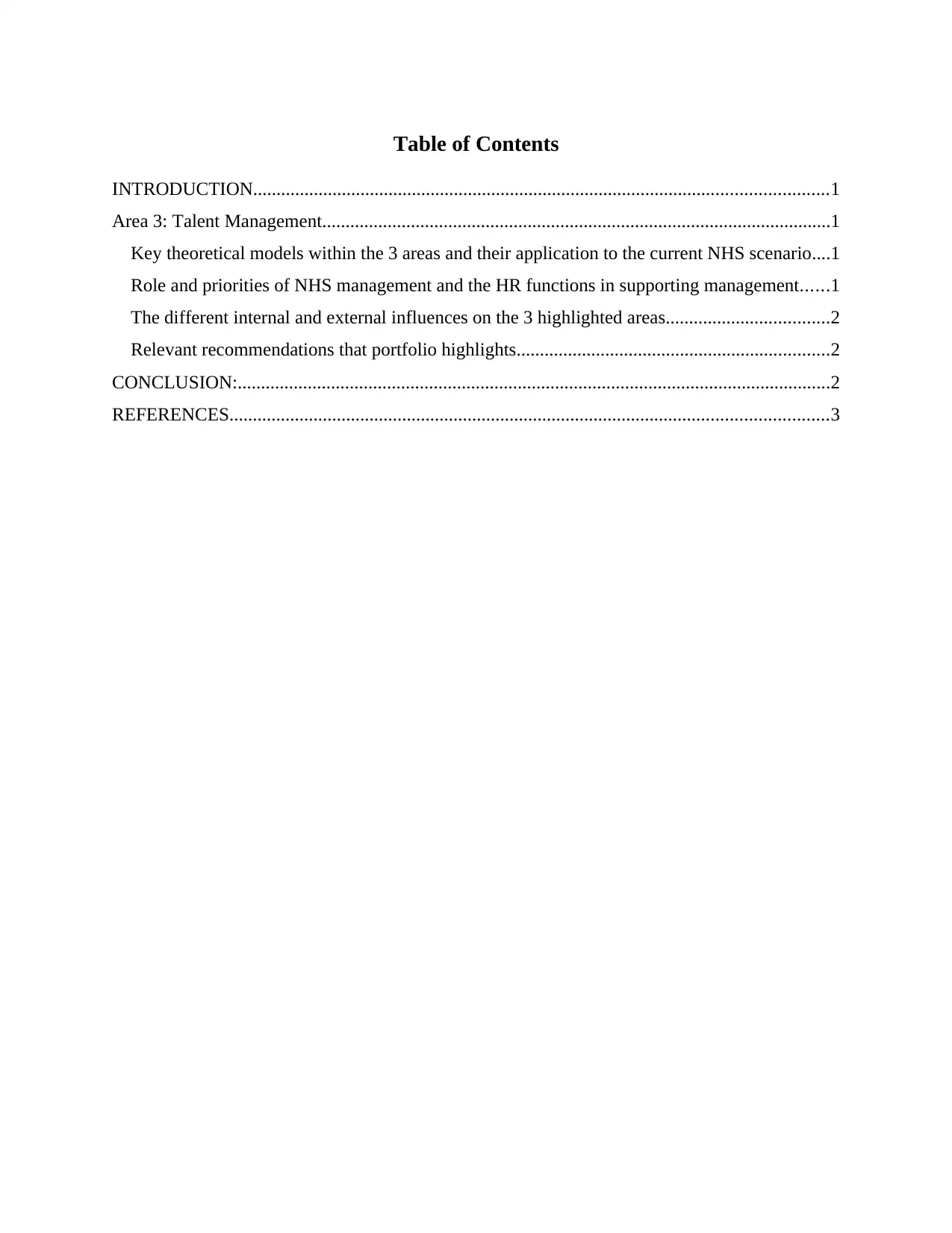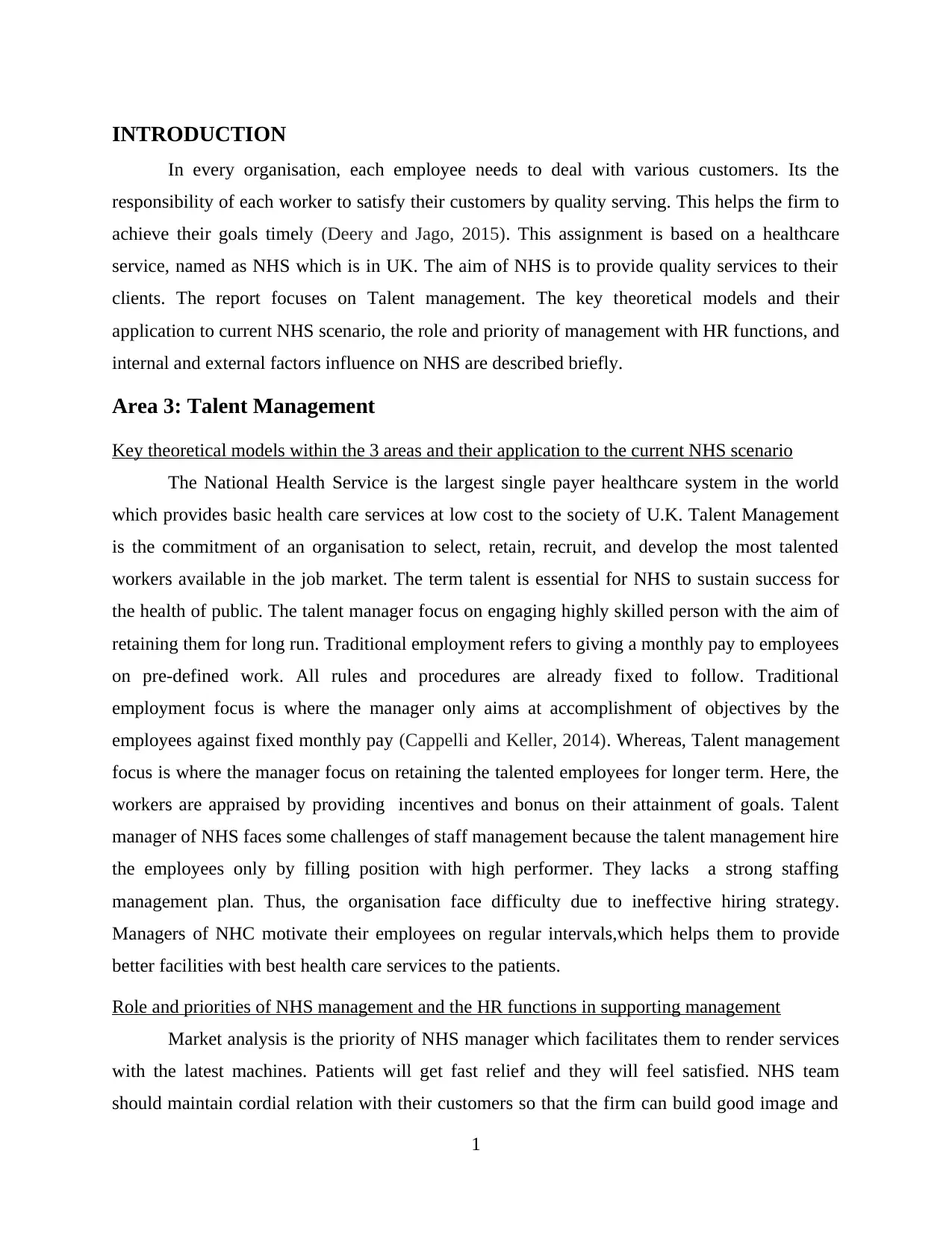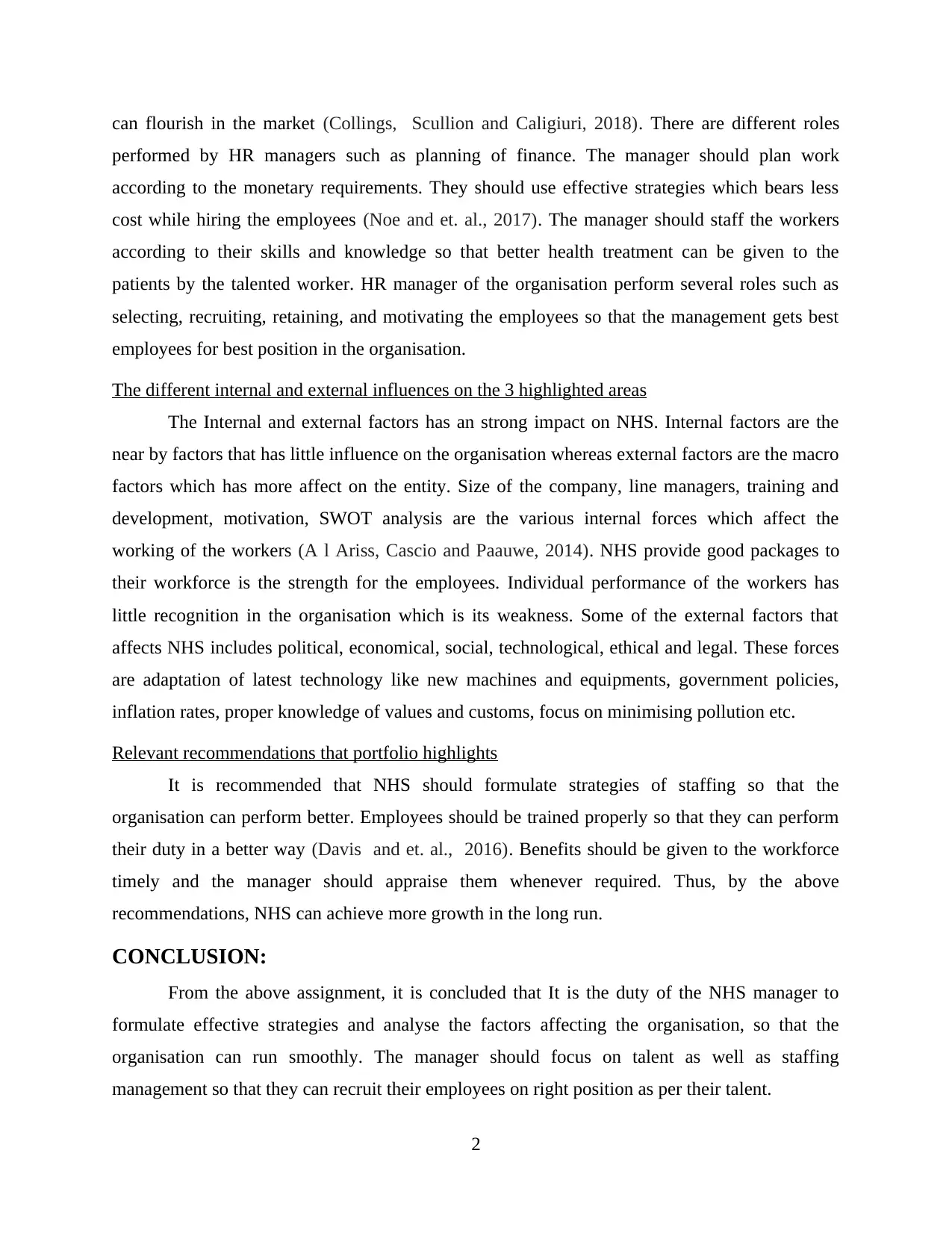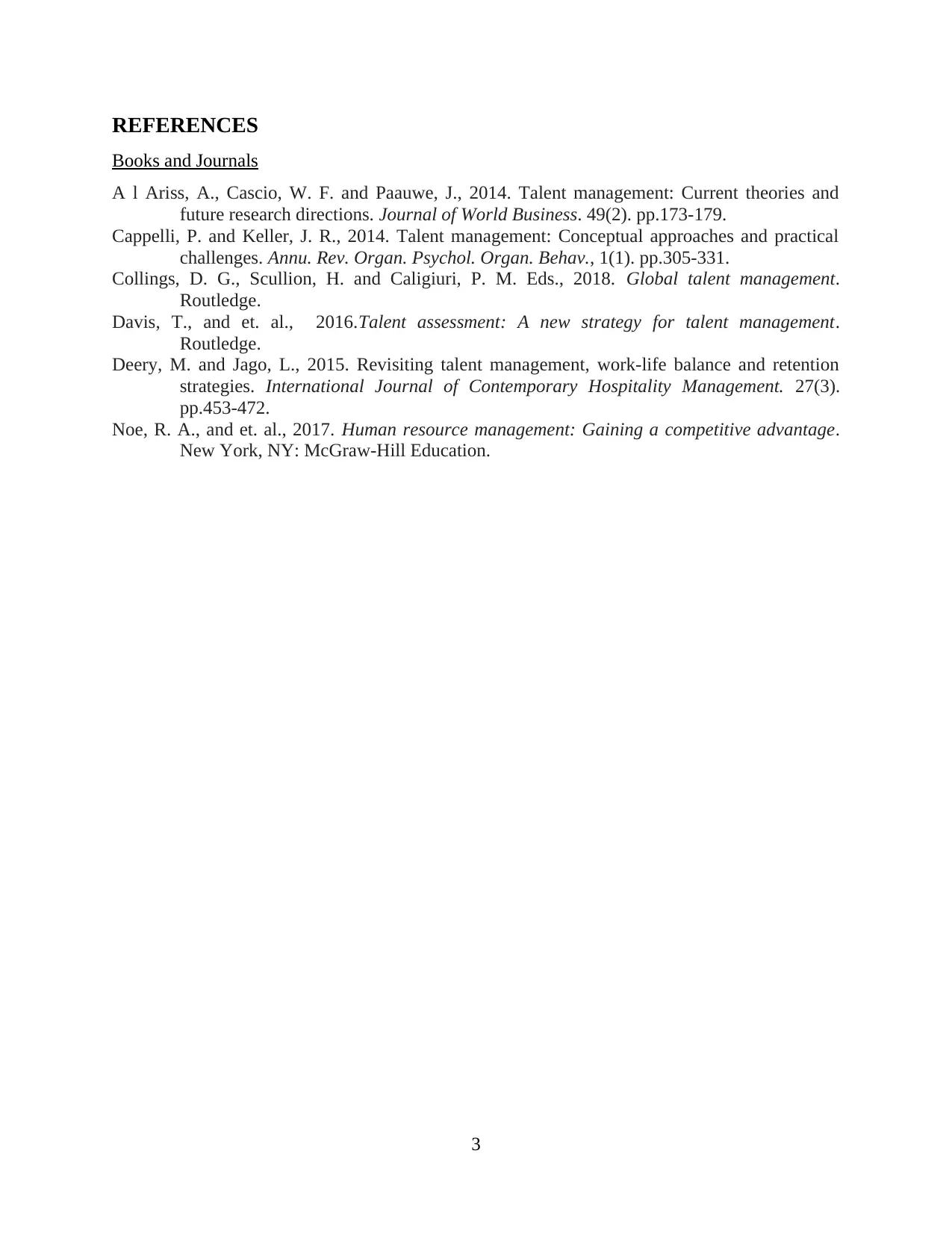Talent Management Report for the UK National Health Service
VerifiedAdded on 2020/10/23
|6
|1156
|413
Report
AI Summary
This report examines talent management within the UK's National Health Service (NHS). It begins with an introduction to talent management and its importance in healthcare, particularly focusing on the NHS. The report explores key theoretical models relevant to talent management and their application to the current NHS scenario. It then delves into the role and priorities of NHS management and the HR functions that support it, emphasizing market analysis, financial planning, and employee staffing. Furthermore, the report analyzes the internal and external influences impacting the NHS, such as company size, training, and economic factors. Finally, it provides recommendations for improving staffing strategies and employee training, concluding with a summary of the key findings and the importance of talent management for the NHS's success.

Management
Style
Style
Paraphrase This Document
Need a fresh take? Get an instant paraphrase of this document with our AI Paraphraser

Table of Contents
INTRODUCTION...........................................................................................................................1
Area 3: Talent Management.............................................................................................................1
Key theoretical models within the 3 areas and their application to the current NHS scenario....1
Role and priorities of NHS management and the HR functions in supporting management......1
The different internal and external influences on the 3 highlighted areas...................................2
Relevant recommendations that portfolio highlights...................................................................2
CONCLUSION:...............................................................................................................................2
REFERENCES................................................................................................................................3
INTRODUCTION...........................................................................................................................1
Area 3: Talent Management.............................................................................................................1
Key theoretical models within the 3 areas and their application to the current NHS scenario....1
Role and priorities of NHS management and the HR functions in supporting management......1
The different internal and external influences on the 3 highlighted areas...................................2
Relevant recommendations that portfolio highlights...................................................................2
CONCLUSION:...............................................................................................................................2
REFERENCES................................................................................................................................3

⊘ This is a preview!⊘
Do you want full access?
Subscribe today to unlock all pages.

Trusted by 1+ million students worldwide

INTRODUCTION
In every organisation, each employee needs to deal with various customers. Its the
responsibility of each worker to satisfy their customers by quality serving. This helps the firm to
achieve their goals timely (Deery and Jago, 2015). This assignment is based on a healthcare
service, named as NHS which is in UK. The aim of NHS is to provide quality services to their
clients. The report focuses on Talent management. The key theoretical models and their
application to current NHS scenario, the role and priority of management with HR functions, and
internal and external factors influence on NHS are described briefly.
Area 3: Talent Management
Key theoretical models within the 3 areas and their application to the current NHS scenario
The National Health Service is the largest single payer healthcare system in the world
which provides basic health care services at low cost to the society of U.K. Talent Management
is the commitment of an organisation to select, retain, recruit, and develop the most talented
workers available in the job market. The term talent is essential for NHS to sustain success for
the health of public. The talent manager focus on engaging highly skilled person with the aim of
retaining them for long run. Traditional employment refers to giving a monthly pay to employees
on pre-defined work. All rules and procedures are already fixed to follow. Traditional
employment focus is where the manager only aims at accomplishment of objectives by the
employees against fixed monthly pay (Cappelli and Keller, 2014). Whereas, Talent management
focus is where the manager focus on retaining the talented employees for longer term. Here, the
workers are appraised by providing incentives and bonus on their attainment of goals. Talent
manager of NHS faces some challenges of staff management because the talent management hire
the employees only by filling position with high performer. They lacks a strong staffing
management plan. Thus, the organisation face difficulty due to ineffective hiring strategy.
Managers of NHC motivate their employees on regular intervals,which helps them to provide
better facilities with best health care services to the patients.
Role and priorities of NHS management and the HR functions in supporting management
Market analysis is the priority of NHS manager which facilitates them to render services
with the latest machines. Patients will get fast relief and they will feel satisfied. NHS team
should maintain cordial relation with their customers so that the firm can build good image and
1
In every organisation, each employee needs to deal with various customers. Its the
responsibility of each worker to satisfy their customers by quality serving. This helps the firm to
achieve their goals timely (Deery and Jago, 2015). This assignment is based on a healthcare
service, named as NHS which is in UK. The aim of NHS is to provide quality services to their
clients. The report focuses on Talent management. The key theoretical models and their
application to current NHS scenario, the role and priority of management with HR functions, and
internal and external factors influence on NHS are described briefly.
Area 3: Talent Management
Key theoretical models within the 3 areas and their application to the current NHS scenario
The National Health Service is the largest single payer healthcare system in the world
which provides basic health care services at low cost to the society of U.K. Talent Management
is the commitment of an organisation to select, retain, recruit, and develop the most talented
workers available in the job market. The term talent is essential for NHS to sustain success for
the health of public. The talent manager focus on engaging highly skilled person with the aim of
retaining them for long run. Traditional employment refers to giving a monthly pay to employees
on pre-defined work. All rules and procedures are already fixed to follow. Traditional
employment focus is where the manager only aims at accomplishment of objectives by the
employees against fixed monthly pay (Cappelli and Keller, 2014). Whereas, Talent management
focus is where the manager focus on retaining the talented employees for longer term. Here, the
workers are appraised by providing incentives and bonus on their attainment of goals. Talent
manager of NHS faces some challenges of staff management because the talent management hire
the employees only by filling position with high performer. They lacks a strong staffing
management plan. Thus, the organisation face difficulty due to ineffective hiring strategy.
Managers of NHC motivate their employees on regular intervals,which helps them to provide
better facilities with best health care services to the patients.
Role and priorities of NHS management and the HR functions in supporting management
Market analysis is the priority of NHS manager which facilitates them to render services
with the latest machines. Patients will get fast relief and they will feel satisfied. NHS team
should maintain cordial relation with their customers so that the firm can build good image and
1
Paraphrase This Document
Need a fresh take? Get an instant paraphrase of this document with our AI Paraphraser

can flourish in the market (Collings, Scullion and Caligiuri, 2018). There are different roles
performed by HR managers such as planning of finance. The manager should plan work
according to the monetary requirements. They should use effective strategies which bears less
cost while hiring the employees (Noe and et. al., 2017). The manager should staff the workers
according to their skills and knowledge so that better health treatment can be given to the
patients by the talented worker. HR manager of the organisation perform several roles such as
selecting, recruiting, retaining, and motivating the employees so that the management gets best
employees for best position in the organisation.
The different internal and external influences on the 3 highlighted areas
The Internal and external factors has an strong impact on NHS. Internal factors are the
near by factors that has little influence on the organisation whereas external factors are the macro
factors which has more affect on the entity. Size of the company, line managers, training and
development, motivation, SWOT analysis are the various internal forces which affect the
working of the workers (A l Ariss, Cascio and Paauwe, 2014). NHS provide good packages to
their workforce is the strength for the employees. Individual performance of the workers has
little recognition in the organisation which is its weakness. Some of the external factors that
affects NHS includes political, economical, social, technological, ethical and legal. These forces
are adaptation of latest technology like new machines and equipments, government policies,
inflation rates, proper knowledge of values and customs, focus on minimising pollution etc.
Relevant recommendations that portfolio highlights
It is recommended that NHS should formulate strategies of staffing so that the
organisation can perform better. Employees should be trained properly so that they can perform
their duty in a better way (Davis and et. al., 2016). Benefits should be given to the workforce
timely and the manager should appraise them whenever required. Thus, by the above
recommendations, NHS can achieve more growth in the long run.
CONCLUSION:
From the above assignment, it is concluded that It is the duty of the NHS manager to
formulate effective strategies and analyse the factors affecting the organisation, so that the
organisation can run smoothly. The manager should focus on talent as well as staffing
management so that they can recruit their employees on right position as per their talent.
2
performed by HR managers such as planning of finance. The manager should plan work
according to the monetary requirements. They should use effective strategies which bears less
cost while hiring the employees (Noe and et. al., 2017). The manager should staff the workers
according to their skills and knowledge so that better health treatment can be given to the
patients by the talented worker. HR manager of the organisation perform several roles such as
selecting, recruiting, retaining, and motivating the employees so that the management gets best
employees for best position in the organisation.
The different internal and external influences on the 3 highlighted areas
The Internal and external factors has an strong impact on NHS. Internal factors are the
near by factors that has little influence on the organisation whereas external factors are the macro
factors which has more affect on the entity. Size of the company, line managers, training and
development, motivation, SWOT analysis are the various internal forces which affect the
working of the workers (A l Ariss, Cascio and Paauwe, 2014). NHS provide good packages to
their workforce is the strength for the employees. Individual performance of the workers has
little recognition in the organisation which is its weakness. Some of the external factors that
affects NHS includes political, economical, social, technological, ethical and legal. These forces
are adaptation of latest technology like new machines and equipments, government policies,
inflation rates, proper knowledge of values and customs, focus on minimising pollution etc.
Relevant recommendations that portfolio highlights
It is recommended that NHS should formulate strategies of staffing so that the
organisation can perform better. Employees should be trained properly so that they can perform
their duty in a better way (Davis and et. al., 2016). Benefits should be given to the workforce
timely and the manager should appraise them whenever required. Thus, by the above
recommendations, NHS can achieve more growth in the long run.
CONCLUSION:
From the above assignment, it is concluded that It is the duty of the NHS manager to
formulate effective strategies and analyse the factors affecting the organisation, so that the
organisation can run smoothly. The manager should focus on talent as well as staffing
management so that they can recruit their employees on right position as per their talent.
2

REFERENCES
Books and Journals
A l Ariss, A., Cascio, W. F. and Paauwe, J., 2014. Talent management: Current theories and
future research directions. Journal of World Business. 49(2). pp.173-179.
Cappelli, P. and Keller, J. R., 2014. Talent management: Conceptual approaches and practical
challenges. Annu. Rev. Organ. Psychol. Organ. Behav., 1(1). pp.305-331.
Collings, D. G., Scullion, H. and Caligiuri, P. M. Eds., 2018. Global talent management.
Routledge.
Davis, T., and et. al., 2016.Talent assessment: A new strategy for talent management.
Routledge.
Deery, M. and Jago, L., 2015. Revisiting talent management, work-life balance and retention
strategies. International Journal of Contemporary Hospitality Management. 27(3).
pp.453-472.
Noe, R. A., and et. al., 2017. Human resource management: Gaining a competitive advantage.
New York, NY: McGraw-Hill Education.
3
Books and Journals
A l Ariss, A., Cascio, W. F. and Paauwe, J., 2014. Talent management: Current theories and
future research directions. Journal of World Business. 49(2). pp.173-179.
Cappelli, P. and Keller, J. R., 2014. Talent management: Conceptual approaches and practical
challenges. Annu. Rev. Organ. Psychol. Organ. Behav., 1(1). pp.305-331.
Collings, D. G., Scullion, H. and Caligiuri, P. M. Eds., 2018. Global talent management.
Routledge.
Davis, T., and et. al., 2016.Talent assessment: A new strategy for talent management.
Routledge.
Deery, M. and Jago, L., 2015. Revisiting talent management, work-life balance and retention
strategies. International Journal of Contemporary Hospitality Management. 27(3).
pp.453-472.
Noe, R. A., and et. al., 2017. Human resource management: Gaining a competitive advantage.
New York, NY: McGraw-Hill Education.
3
⊘ This is a preview!⊘
Do you want full access?
Subscribe today to unlock all pages.

Trusted by 1+ million students worldwide
1 out of 6
Related Documents
Your All-in-One AI-Powered Toolkit for Academic Success.
+13062052269
info@desklib.com
Available 24*7 on WhatsApp / Email
![[object Object]](/_next/static/media/star-bottom.7253800d.svg)
Unlock your academic potential
Copyright © 2020–2025 A2Z Services. All Rights Reserved. Developed and managed by ZUCOL.





